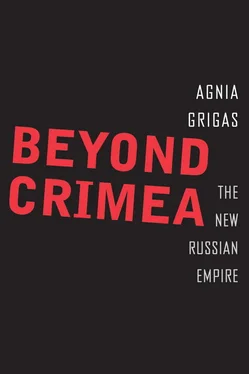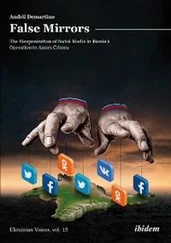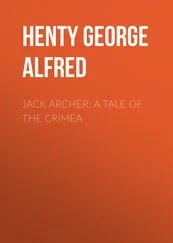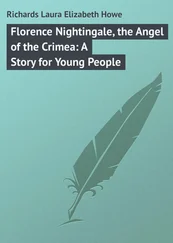In this book I will demonstrate how the reimperialization trajectory is employed in action through case studies of nearly all of the post-Soviet states. Countries will be grouped and analyzed not always by their geographic proximity but rather by where they fall on this trajectory. The analysis will group states like Ukraine, Georgia, and Moldova that have demonstrated the full spectrum of Russia’s reimperialization policies including de facto or de jure annexation of their territories. The Baltic States will be viewed together because with significant ethnic Russian and Russian-speaking populations they demonstrate the extent, limits, and risks of Russia’s compatriot policies in EU and NATO member states. The Central Asian states have demonstrated relative success in repelling Moscow’s measures including efforts at passportization of ethnic Russian and Russian-speaking minorities. The focus will be on Kazakhstan, which also faces the greatest risk of separatism and conflict due to its vast territories bordering Russia that are populated by a large Russian minority. Russia’s dependent allies, Belarus and Armenia, will be discussed together because they offer alternative lessons as the seemingly least likely sites of Russia’s aggression. Azerbaijan and a few of the Central Asian countries will be awarded less attention as they do not significantly add new insights on Moscow’s reimperialization efforts and in the latter cases, publicly available information is limited.
To offset the facts and figures of historical and contemporary realities of Moscow’s compatriot policies and the Russian diaspora, I will rely on the warmth of human voices of this largely misunderstood but highly politicized group of people. Each country study will present portraits of ethnic Russians and Russian speakers selected from nearly a hundred interviews. I have specifically reached out to younger Russians and Russophones born following the dissolution of the Soviet Union. They represent the future generation of a population that Russia would like to claim as its compatriots and they will likely impact their countries’ relations with Moscow in the years to come. Russian speakers rather than solely ethnic Russians have been selected because in most of the analyzed countries, language, identity, ethnicity, and citizenship do not always go hand in hand. Furthermore, Russia often opportunistically counts among its compatriots those who are Russian-language speakers, whatever their relationship to these other categories, or simply those who have a cultural or spiritual connection with Russia or the Orthodox Church. Certainly this is no scientific survey, as I could not gather a representative sample from every ethnic, age, or socio-economic group. Likewise, only the voices of those who were willing to be interviewed will be heard here. In many (though not all) cases they represent a more Westernized, open, and perhaps bold group than their peers. Some, residing in remote corners of autocratic countries and frozen-conflict territories, were often too fearful to participate in my survey, or simply unreachable. The purpose of letting these voices be heard is thus, not to offer a scientific portrait of the Russian compatriot, but rather to humanize the issues at stake and to illustrate more vividly the complexity of the feelings within and across different people. Likewise, this is a story of countries, peoples, and issues that until recently have not received much attention from mainstream scholars and analysts. As such I have sought to tell this story as authentically as possible, supplementing my research of documents, policies, media reports, and academic studies with the insights of local experts and scholars. My approach is likewise driven by my goal of shedding light on the complex and multidimensional issues at stake in Moscow’s efforts to engage and co-opt its compatriots. Many of Russia’s policies follow the now widely accepted paradigm of “winning the hearts and minds” 23of target peoples, albeit with a mix of coercion, information warfare, and the threat of military aggression. As the case studies will demonstrate, Moscow has outmatched the target countries in their own efforts to engage their Russian minorities. However, an effective response to Moscow’s policies in the form of counterengagement strategies can be launched only with a deeper understanding of these target “compatriot” populations. This book will offer insight into a group of people spread across Ukraine, Georgia, Moldova, the Baltic States, Kazakhstan, Kyrgyzstan, and elsewhere that Moscow has tried to claim but both their home countries and the West would also be wise to engage.
RUSSIAN “EMPIRE”: THE EVOLUTION OF A CONCEPT
In addition to being a study of Russian compatriots this book is also a study of the Russian reimperialization project. The use of terms such as “empire” and “reimperialization” may appear dramatic and archaic. Nonetheless, scholars are talking more of empire today than they did twenty-five years ago. What do these terms mean? Reimperialization means the reemergence, revival, or reconstitution of empire. 24International relations scholar Michael Doyle defines empire as “a relationship, formal or informal, in which one state controls the effective political sovereignty of another political society. It can be achieved by force, by political collaboration, by economic, social, or cultural dependence.” 25For Motyl, empire is more about the funneling of resources from the periphery to the core. He characterizes empire “as a hierarchically organized political system with a hub-like structure—a rimless wheel—within which a core elite and state dominate peripheral elites and societies by serving as intermediaries for their significant interactions and by channeling resource flows from the periphery to the core and back to the periphery.” 26For the purposes of the argument of this book, I consider the contemporary Russian Federation as an “empire” and the successor of the historical Soviet and Romanov empires—a concept that requires some explanation, especially as regards the Soviet Union.
Russian history is a history of empire. The Russian Empire was officially proclaimed by Tsar Peter the Great in 1721 and lasted until Russia’s first (February) revolution in 1917. At its peak it stretched over Europe and Asia to North America and included colonies in Alaska and northern California. In landmass it was one of the largest empires in history, surpassed only by the British and Mongol empires. However, the Russian Empire’s origins date even earlier—it grew from the Muscovite Russia in the fifteenth century, particularly after Ivan the Terrible was proclaimed tsar in 1547. An important feature of the Russian Empire was serfdom—landless peasants who belonged to the feudal landlord. The concept was almost the equivalent of slavery, as the master could do as he pleased with his serfs and their families, who in 1857 included nearly 40 percent of the empire’s population. 27Established as early as the eleventh century, the system was abolished by decree in 1861 (the same year the American Civil War broke out to end slavery) but many conditions of serfdom persisted.
Indeed, in Russian history, the ideas of empire, tsars, and serfdom are dominant threads that have contributed to present-day Russia and its foreign policy. The culture of a strong leader (a tsar) and of vast masses in bondage (serfs) continues to influence Russian society and identity, and also, as I will demonstrate in Chapter 3, Moscow’s top-down policies toward its “compatriots.” Motyl’s idea of empire as a mechanism of funneling resources from the periphery to the center is also related to unique conditions of the Russian empire. The system of serfdom was introduced by Moscow into newly acquired territories, which increasingly were colonized by Russian or loyal landlords, and thus facilitated the extraction of resources from the periphery to the center.
Читать дальше












